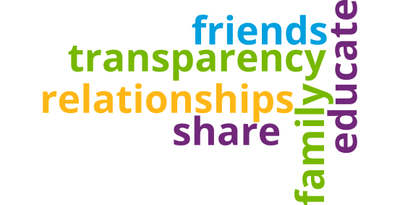Sharing the Journey: Building New Relationships
The Sharing the Journey series is by you and for you. In your own words, we highlight the perspectives and personal experiences of people who struggle with lupus each day.
This month, we asked Sharing the Journey participants the following question:
When building a new relationship, whether friendship or romantic, what do you want that person to know about lupus and how it affects you and may affect your relationship with them?

In building new relationships, I want the person to know that lupus can become active at any time without any notice therefore I may have to cancel plans last minute. I also need that person to understand that when I say “I’m tired,” this does not equate to your tired, and I really need to rest. By explaining all of this I’m letting that person know there may be times when I may seem unreliable, but if you’ll just stick with me through the rough patches, I’ll be there for you during the good ones. – Kayla
When building a new relationship or friendship, I have found that it is so important to educate the person about lupus immediately – specifically how it affects me because ultimately it will have an effect on them as well. There is so much to share about lupus, but in my experience it has been better to share key points so the person doesn’t get overwhelmed. As time progresses, there are greater opportunities to expand on what you share. Here are some of the key points I share:
- Lupus is an autoimmune disease that causes my body to fight its own tissues and organs, causing inflammation and damage
- There is no cure and it can be fatal
- It affects each person differently, so I’m not going to have the same symptoms or treatment as someone else you may know with the disease
- I spend a lot of time at doctor appointments, as well as some time at hospitals.
- There are times where I’m able to everyday tasks, like tying my shoes, and other times where I’m not able to. Lupus takes away my energy so this could affect what we’re able to do, where we’re able to go, and how long we’re able to stay. I will need a lot of patience and understanding.
- It’s alright to ask questions. Open communication is the key to any successful relationship
If it is something they believe they can handle, I then give more information about my personal experiences living with lupus and then together we are able to establish expectations for our relationship or friendship. – Angel
Building a new relationship can be hard when they don’t know anything about lupus, which is very common. I think most importantly, you need to educate them on it. This way it won’t be something to fear. Then you can explain that sometimes plans have to change at the last minute depending on how you feel since the reality is that you never know when a flare is coming. If they understand that you are not being flakey or making excuses, they can be there to support you. – Roxi
I normally wait until I am pretty close with someone before I reveal my lupus diagnosis. My philosophy is that my lupus doesn't define me, but oftentimes others who don't know me as well always associate me with my disease. When I do reveal my diagnosis, I normally talk about how it affects the amount of energy I have during the day. While many people can go to work and then go out with friends afterwards, that's just not possible for me. While many people can take a sick day then bounce back quickly, I take longer to heal. These limitations affect the amount of time I can spend with other people, and it's normally what I like to talk to close friends about. – Becca
I think it's really important to be open and honest with people. Being chronically ill for over a decade, I've realized that I don't want to be friends or have a relationship with someone who isn't accepting of something that’s such a big part of my life. – Leslie
I believe in any relationship that you are in, honesty is the best policy. If you try to hide your illness, it will definitely manifest in your relationships. I have seen relationships destroyed by not telling the significant other. The best advice I can give is when you make the choice to establish a new relationship, let them know and it will be their choice to continue and deal with what comes along with living with your illness. For some people, it's too much and they run the other way. For others, they’re with you all the way. It's not fair to be treated poorly because of sickness. – Sylvia
Nobody should have to handle their lupus journey all on their own. You deserve loved ones in your corner who can not only help you navigate living with lupus but can also bring joy and fun into your life. Having honest conversations about your lupus diagnosis with those people in your life can assist with building those relationships.
It’s difficult to know when and how much you should explain when forming new relationships – and ultimately only you can make those decisions for yourself. But if you do decide to disclose your lupus diagnosis to a friend or partner, this resource, along with this printable guide can help get your conversation started and walk you through explaining a complex disease. You can also direct your friends and partners to advice on how they can help you through your lupus journey, a communication tool to identify what kind of assistance they can give you, and a toolkit for caregivers – all great resources for someone who plans to play a bigger role in your lupus journey.



